After 19 years, three men accused of brutally murdering a married couple had their names cleared once again yesterday and walked free after a retrial found them not guilty in light of a new forensic report.
The latest verdict was reached yesterday morning by the Taiwan High Court and immediately left a family member of the two victims expressing frustration, requesting that prosecutors launch a Supreme Court appeal.
Known in English as the “Hsichih Trio,” Su Chien-ho (蘇建和), Liu Bin-lang (劉秉郎) and Chuang Lin-hsun (莊林勳) were accused in August 1991 of breaking and entering an apartment in Sijhih (汐止), Taipei County, in search of valuables.

Photo: Chu Pei-hsiung, Taipei Times
Along with Wang Wen-hsiao (王文孝), an army conscript who was later executed under military law, the three men were accused of taking turns to rape Yeh Ying-lan (葉盈蘭) and then stabbing and bludgeoning both her and her husband, Wu Min-han (吳銘漢), to death, according to an original indictment.
The case has taken a series of legal twists and turns between 1995 and 2007, including in May 2000, when then-state public -prosecutor-general Chen Han (陳涵) made three extraordinary appeals to the Supreme Court for a retrial and the High Court decided to retry the case.
In January 2003, the High Court acquitted the trio and released them. However, prosecutors appealed the case back to the Supreme Court, which ordered yet another retrial and the high court again sentenced them to death in June 2007, although the trio was not detained.

Photo: Chu Pei-hsiung, Taipei Times
During their stay on death row, President Ma Ying-jeou (馬英九), who was serving as justice minister at the time, refused to sign the sentence, saying there were still too many unanswered questions.
To fight the High Court’s death sentence, the trio’s panel of lawyers tried to press their case publicly in August last year, presenting a forensic report by forensic scientist Henry Lee (李昌鈺) that said a single killer could have carried out the double murder and rape.
In the latest verdict rendered by the Taiwan High Court yesterday, it suggested there were multiple problems with the forensic evidence taken immediately after the crime. Referring to new information given in the forensic report by Lee, the new ruling said that Wang had most likely acted alone in committing the two murders.
Upon hearing the ruling, the three men, accused since they were 19, quietly stood up and bowed deeply to the judge. Dressed casually in white sneakers, jeans and light jackets, they then turned around and somberly gave their lawyer a group hug.
Su, Liu and Chuang had originally pleaded guilty to the crime during their initial testimony, after Wang told investigators that both his younger brother and the three others were involved. While Wang’s brother received 32 months in prison as an accessory to murder, the three later retracted their confessions, saying that they had been made under torture.
Their lawyers had argued that neither police nor prosecutors have ever presented direct evidence to prove their guilt.
“I was framed by the police at the time and I have always carried the knowledge that I am innocent,” Chuang, now 38, said, speaking outside the courtroom after the ruling.
The three also expressed their gratitude to the judicial system and said they wanted to thank society.
Liu, also 38, said the verdict “was something that we were owed, after all, we had been waiting for the word ‘innocent’ for almost 20 years now.”
A key part of how the verdict was reached “was most likely due to Dr Lee’s forensic report,” he said.
Lee, a prominent forensic scientist in the US, completed his forensic report last year and was called to testify in the case in August this year. Based on his analysis, Lee concluded that the scenario originally laid out by prosecutors was “highly improbable.”
Contradictions in the findings include a lack of bludgeon wounds on the body, a discrepancy in the number of knife wounds and a lack of indicators on Yeh’s body consistent with sexual assault. Based on the confined area and other evidence at the scene, which included only one set of fingerprints and shoe prints, Lee said it was “extremely likely” that Wang was the sole culprit.
Yesterday’s court ruling said that: “After reviewing each point, the court believes that Dr Lee’s forensic report is credible.”
This is the second time that the three have been found not guilty by the courts, but in a signal that the court case could still continue, a representative of the victims’ families said he hoped prosecutors would appeal the latest verdict back to the Supreme Court.
“I have only [one] word to describe this ruling: ‘frustration.’ The views I have held for near 20 years now are that justice and righteousness are asleep,” Wu Min-han’s brother, Wu Tang-chieh (吳唐接), said outside the courtroom.
“We won’t give up, but we don’t know when the injustice suffered by my brother and his wife will become righted,” he added.
ADDITIONAL REPORTING BY CNA

ENDEAVOR MANTA: The ship is programmed to automatically return to its designated home port and would self-destruct if seized by another party The Endeavor Manta, Taiwan’s first military-specification uncrewed surface vehicle (USV) tailor-made to operate in the Taiwan Strait in a bid to bolster the nation’s asymmetric combat capabilities made its first appearance at Kaohsiung’s Singda Harbor yesterday. Taking inspiration from Ukraine’s navy, which is using USVs to force Russia’s Black Sea fleet to take shelter within its own ports, CSBC Taiwan (台灣國際造船) established a research and development unit on USVs last year, CSBC chairman Huang Cheng-hung (黃正弘) said. With the exception of the satellite guidance system and the outboard motors — which were purchased from foreign companies that were not affiliated with Chinese-funded

PERMIT REVOKED: The influencer at a news conference said the National Immigration Agency was infringing on human rights and persecuting Chinese spouses Chinese influencer “Yaya in Taiwan” (亞亞在台灣) yesterday evening voluntarily left Taiwan, despite saying yesterday morning that she had “no intention” of leaving after her residence permit was revoked over her comments on Taiwan being “unified” with China by military force. The Ministry of the Interior yesterday had said that it could forcibly deport the influencer at midnight, but was considering taking a more flexible approach and beginning procedures this morning. The influencer, whose given name is Liu Zhenya (劉振亞), departed on a 8:45pm flight from Taipei International Airport (Songshan airport) to Fuzhou, China. Liu held a news conference at the airport at 7pm,

AIR SUPPORT: The Ministry of National Defense thanked the US for the delivery, adding that it was an indicator of the White House’s commitment to the Taiwan Relations Act Deputy Minister of National Defense Po Horng-huei (柏鴻輝) and Representative to the US Alexander Yui on Friday attended a delivery ceremony for the first of Taiwan’s long-awaited 66 F-16C/D Block 70 jets at a Lockheed Martin Corp factory in Greenville, South Carolina. “We are so proud to be the global home of the F-16 and to support Taiwan’s air defense capabilities,” US Representative William Timmons wrote on X, alongside a photograph of Taiwanese and US officials at the event. The F-16C/D Block 70 jets Taiwan ordered have the same capabilities as aircraft that had been upgraded to F-16Vs. The batch of Lockheed Martin

GRIDLOCK: The National Fire Agency’s Special Search and Rescue team is on standby to travel to the countries to help out with the rescue effort A powerful earthquake rocked Myanmar and neighboring Thailand yesterday, killing at least three people in Bangkok and burying dozens when a high-rise building under construction collapsed. Footage shared on social media from Myanmar’s second-largest city showed widespread destruction, raising fears that many were trapped under the rubble or killed. The magnitude 7.7 earthquake, with an epicenter near Mandalay in Myanmar, struck at midday and was followed by a strong magnitude 6.4 aftershock. The extent of death, injury and destruction — especially in Myanmar, which is embroiled in a civil war and where information is tightly controlled at the best of times —